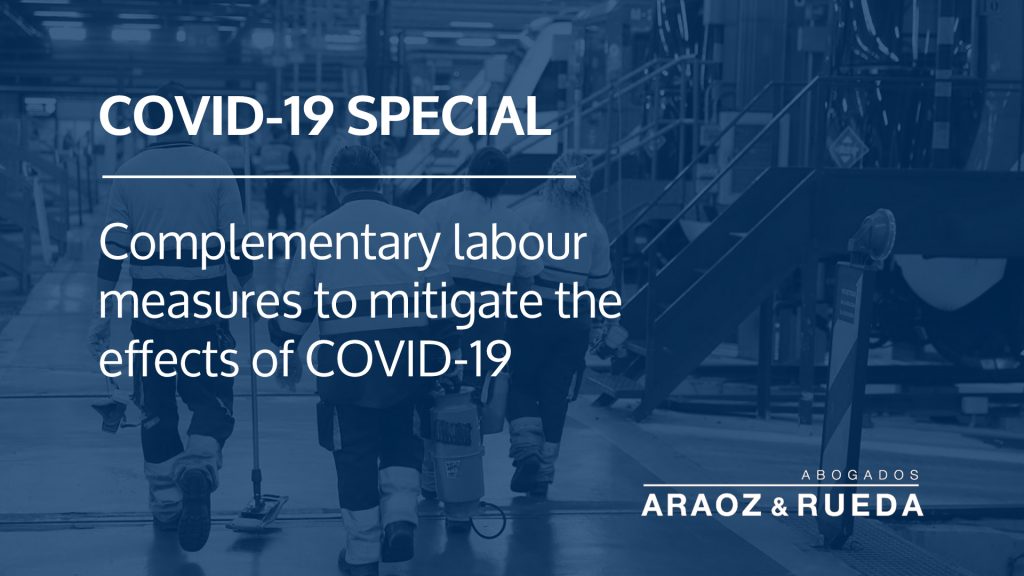On 28 March 2020, the Spanish Government has extended the state of alarm by 15 additional days (until 11 April 2020, inclusive).
On the same day, Royal Decree-Law 9/2020, of March 27, 2020, adopting additional measures, in the field of employment, to soften the effects of COVID-19 (“RDL 9/2020”), was published. These new measures are additional to those included in Royal Decree-Law 8/2020, of March 17, on urgent extraordinary measures to deal with the economic and social impact of COVID-19 (“RDL 8/2020”). Generally, these measures are the following:
1. Maintenance of activity in health centres and centres for the care of the elderly
During the state of alarm, health centres, services and facilities, as determined by the Ministry of Health, as well as social centres for the elderly, dependent people or people with disabilities, regardless of their ownership (public or private), will be deemed “essential services”. Consequently, these establishments must maintain their activity, and may only partially reduce or suspend it in the terms permitted by the competent authorities.
Breach or resistance to the orders of the competent authorities in connection with the above will be sanctioned under the terms established in article 10 of Organic Law 4/1981, of June 1, on states of alarm.
2. Extraordinary measures for the protection of employment
Force majeure and the economic, technical, organisational and production causes related to the temporary layoffs (ERTEs) provided for in articles 22 and 23 of RDL 8/2020 cannot be regarded as justifying the termination of the employment contracts or dismissals.
3. Extraordinary measures for speeding up the process and payment of unemployment benefits
The procedure for acknowledging contributory unemployment benefit, for all employees affected by the ERTEs based on the causes set out in articles 22 and 23 of RDL 8/2020, will be initiated by a collective application submitted by the company, acting on behalf of its employees.
The notice will be sent, via electronic means, in the manner determined by the Public Employment Service, within five (5) days
-
- from the application of the ERTE due to force majeure or
- from the notice of the business decision to the competent labour authority in the event of an ERTE due to economic, technical, organizational and production reasons. Likewise, if the relevant ERTE’s application was made before the entry into force of RDL 9/2020, this period will be computed as of 28 March 2020.
The lack of notice will constitute a serious infringement, in accordance with the provisions of article 22.13 of Royal Legislative Decree 5/2000, of 4 August, which approves the revised text of the Labour Infringements and Penalties Law (“LISOS”).
The effective date of the legal situation of unemployment in cases of force majeure will be the date of the event causing the force majeure. However, in the cases in which the existence of economic, technical, organizational or production causes is alleged, said date shall be the date on which the company notifies the decision taken. In any event, the company certificate (certificado de empresa) must include the cause and effective date of the legal situation of unemployment.
4. Interruption of the computation of the maximum duration of temporary contracts
The suspension of temporary contracts, including training, relief and provisional contracts, due to reasons laid down in articles 22 and 23 of RDL 8/2020, will entail the interruption of the computation of both
-
- the term of these contracts and
- the reference periods equivalent to the suspended period.
5. Limitation of the period of the ERTEs due to force majeure
The maximum period of the ERTEs due to force majeure shall not extend beyond the length of the period of the extraordinary situation derived from COVID-19.
6. Sanctions and pay-back of undue benefits
The following actions will be sanctioned in accordance with the LISOS:
-
- the submission of applications by the company that contain misrepresentations or inaccuracies in the data provided and
- the application by the company of measures in relation to employment that are not necessary or have insufficient connection with the cause that gives rise to them, provided that they result in undue benefits.
Likewise, the undue recognition of benefits to the employee, for reasons not attributable to him, as a result of any of the breaches mentioned above, shall entail an ex officio review of the act recognising such benefits. In such cases, and without prejudice to the administrative or criminal liability that may correspond by law, the company shall pay the amounts received by the employee to the management entity, deducting this amounts from the salaries that have not been paid, with the limit of the sum of these salaries. This obligation to return the undue benefits, as an accessory sanction, will be enforceable until the prescription of the relevant infringements referred to in the LISOS, in accordance with the specific rules and validity provided in this RDL 9/2020.
7. Verification of the ERTEs by the Labour Inspectorate
The Labour Inspectorate will include, among others, the verification of the existence of the causes alleged in the applications and communications of the ERTEs provided for in articles 22 and 23 of RDL 8/2020.





